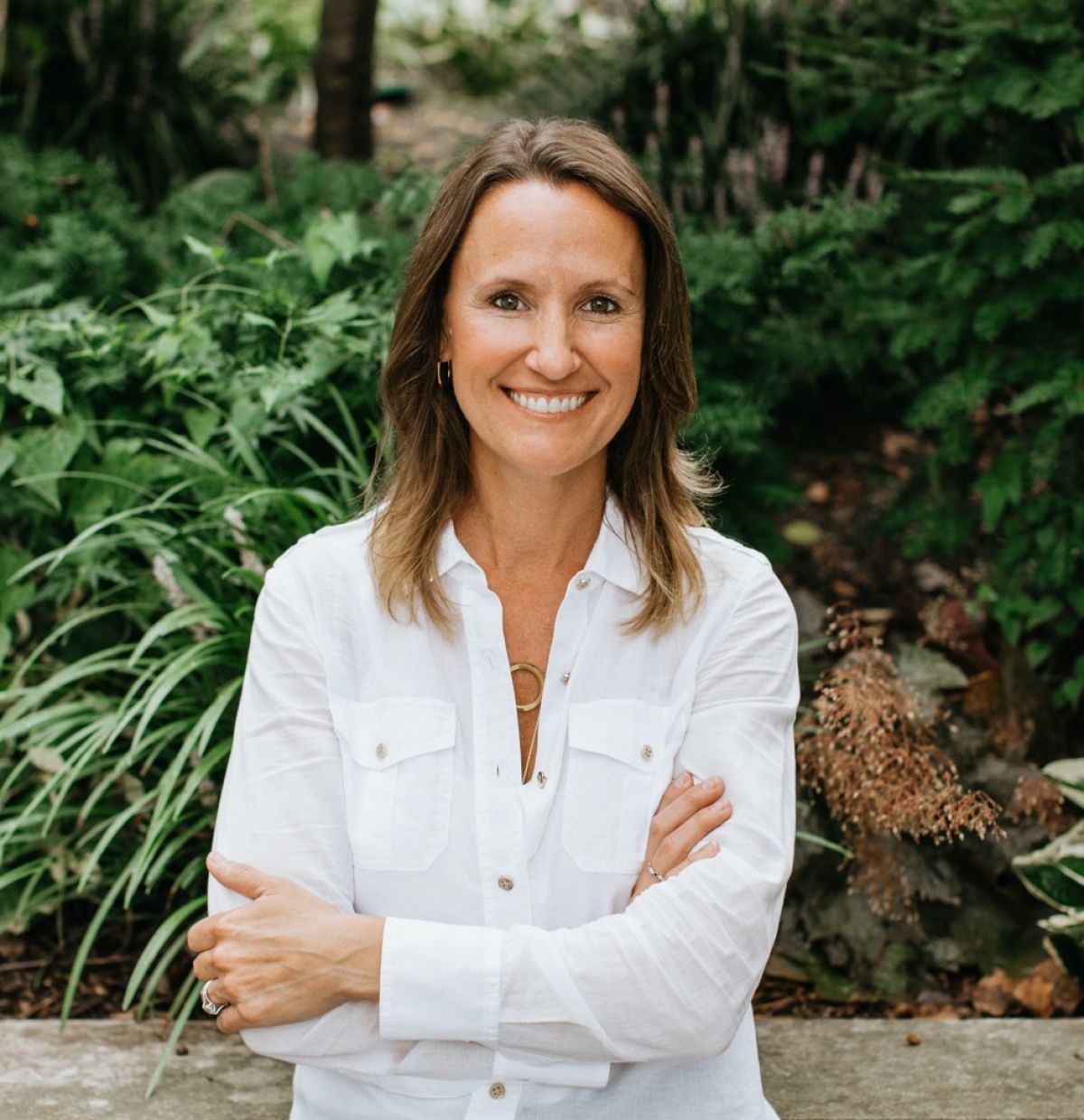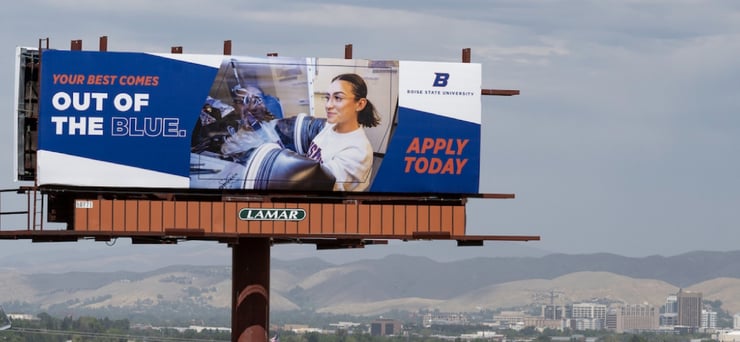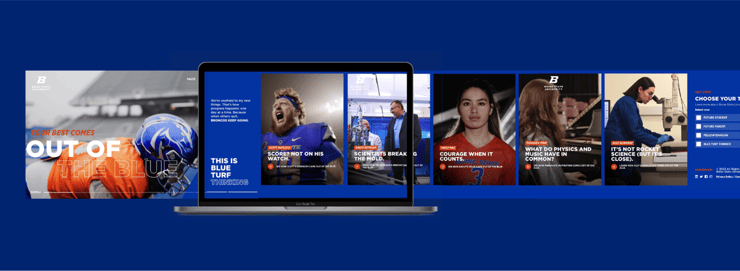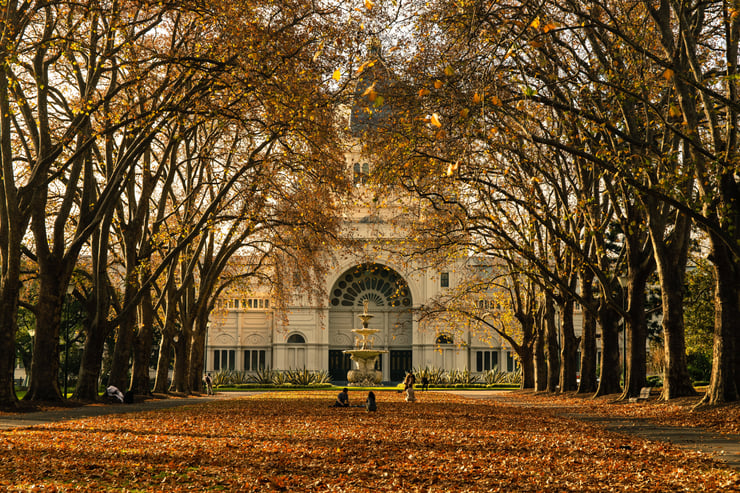In-person visit days for admitted students have long been considered the anchor of the spring recruitment event lineup. Many students make their final college choice immediately after attending these deal-making or deal-breaking events. Just three years ago, I remember going with my son to back-to-back 'admitted student days' at his top two institutions. Just an hour into the event at the second campus, he decided he wanted to attend the school we had visited the previous day, Franklin & Marshall College. He couldn't explain why — it was just a gut feeling.
Fast forward to March of 2020 as the option for in-person events came to a halt nearly overnight, and administrators scrambled to replace them with virtual events. Admitted students lost their final chance to visit campus, meet with faculty and students, and assess that elusive "fit" that so often tips the scale.
Major questions loomed. Can remote yield events be as powerful and motivating as in-person ones? Will the inability to bring admits to campus drive our yield rates down?
Can Remote Yield Events Be Effective?
The shift to remote events continued through the fall of last year and the height of the campus visit season. Many colleges had to rely exclusively on remote events to showcase campus and culture to prospective high school seniors looking to enroll in the fall of 2021. While some offered selective, in-person campus visits, they were dramatically different than in years past because of social distancing guidelines and masks.
More questions emerged: Are the days of student ambassadors walking backward while touring campus with 50 families behind us? Will colleges eventually go back to filling lecture halls with hundreds of students, parents, and siblings for a pre-tour presentation on admission guidelines and financial aid application instructions? Should they go back? Is the student activities fair gone forever?
With a year of experience under their belts, college and university admission officers and marketers are beginning to better understand the challenges and opportunities associated with remote recruitment events. Two things are clear:
- Remote events *can* be as effective (even more effective) than in-person events.
- The key to success is offering a vast array of options and enormous flexibility to meet the individual needs and interests of prospective students and their families. Mass marketing to a herd of families is out. Personalization and microcommunities are in.
The institutions that took the opportunity to rethink and restrategize their campus visit experiences were those that benefitted the most. Here are some of those examples:
Fordham University
Fordham experienced a great deal of success with remote recruitment activities. In March and April of 2021, the University offered more than 250 different events for prospective students. They ranged from 30-minute virtual "welcomes" to one-hour guided virtual tours to two-hour spring previews featuring the President.
Donna Lehman, Fordham's AVP for Marketing, said two key features of the University's events were particularly important and innovative: First, the virtual events were highly segmented and targeted. Rather than lumping students together in large venues and addressing them unilaterally, the remote events included sessions on specific majors and industries. There were sessions for students of color, transfer students, and international students. There were short and long programs on career services, research opportunities, study abroad, and even New York City.
The second innovation at Fordham concerned the formatting of events and transparency about the details so that prospects knew what they're signing up to experience. They articulated the size of each event (large group or small group) and who would appear on camera (only presenters or presenters and participants). They indicated whether there would be a live Q&A at the end of the event. Fordham learned early that virtual event participants vary significantly on the level of engagement they are seeking — some want to be seen and heard while others desire anonymity. In recent years, Fordham would welcome about 20,000 visitors to campus in person. More than 30,000 students attended the Spring 2021 admission events alone. And evaluations of the programs were consistently in the neighborhood of 9 on a 10-point scale.
Baylor University
Baylor's pre-COVID recruitment calendar included two very large, in-person events. The first was a large open house event called, Premiere. Premiere went 100% virtual for 2020, and instead of the hour-long sessions on each academic program that had been part of the program for decades, deans and department heads were asked to spend just 15 minutes talking about their program. And, each talk was focused solely on describing why prospective students should choose Baylor for that particular academic program. The 2020 event was wildly successful, with the largest attendance ever, including all previous in-person events. More than 2,600 prospects participated from every continent in the world except Antarctica. They popped into the event when they wanted and popped out when they wanted.
Baylor's second in-person anchor event supported a scholarship program. Pre-COVID, prospective students came to campus to fulfill one of the scholarship program's application requirements. According to Ross Van Dyke, Baylor's Senior Director of Undergraduate Admission, the 2020 event (which was all virtual) was the most successful in the University's history, attracting more than 6,000 applicants. Van Dyke said, "It was amazing to see students zooming in from all over the world—to see people joining the Baylor community from places like Saudi Arabia." Baylor will go back to offering an in-person option for the scholarship event, but it will continue to provide a remote option as well. "From now on, we have to do both," said Van Dyke.
In total, Baylor conducted nearly 3,000 private, in-person campus visits since the summer of 2020. The visits occur outdoors only and never led to any COVID infections. Students who attend the visits tend to be highly qualified and receive a completely personalized tour that includes a free drink at the coffee shop on-campus and a coupon for a free cupcake at nearby Magnolia Bakery at the famed Silos built by Chip and Joanna Gaines of Fixer Upper fame. It stands to reason that a personal tour would lead to a better conversion rate than a traditional "herd them into the gym" style tour when many visitors have a hard time even hearing what the guide is saying. And, that's exactly what Baylor experienced. While fewer high school seniors visited campus in 2020 vs. 2019, the application rate among visitors increased 23 percentage points. And the rate at which visitors enrolled more than doubled.
Stony Brook University
Options, flexibility, and upgrades were critical ingredients to Stony Brook University's success last year. Stony Brook's virtual tour was rewritten and rerecorded to make it far more robust and engaging. Recruitment presentations were archived on YouTube with captions for those who want to watch them asynchronously. The University replaced in-person campus visits with virtual workshops with faculty, info sessions, chat, events highlighting campus resources, departmental welcomes, Facebook Live Q&As, videos, mini-lectures, lab tours, and "Summer Series" talks. Text messaging became an essential tool for communicating with prospects, used for everything from encouraging event attendance to completing applications and reminding students about making their deposits.
According to Jacqueline Rowe, Senior Enrollment Communications Coordinator, approximately 400 prospects participated in Stony Brook's in-person "visit a class" program the year before COVID compared to over 2,000 attendees at virtual faculty workshops this year (435% increase). Attendance at virtual events for admitted students held through the winter and early spring attracted 21% more students than the prior year's in-person events. "In the future, we will continue to offer both virtual and in-person options to engage students from around the world," said Rowe.
Meredith College
Some institutions were able to resume in-person events as early as the summer of 2020. But, they didn't look like they used to. At Meredith College, in Raleigh, NC, admission representatives met with just one family at a time, masks were required, and social distancing guidelines were strictly enforced. An aggressive digital ad campaign announced the return of the in-person visits, and ultimately the College conducted exactly as many one-on-one in-person visits as one-on-one virtual visits.
"Mass marketing to a herd of families is out. Personalization and microcommunities are in."
Virtual Events That Didn't Work
If options and flexibility are what works, what doesn't work? According to one college, what doesn't work is recording a series of videos of office or program representatives making Powerpoint presentations on Zoom that are just like what they would have done in person. This institution's failed attempt at going virtual was self-described as "clunky, boring, and awkward."
Prospective students want to be engaged with, not lectured to. They want to be able to join an event when there is content that appeals to them and jump out when they need a break. They want to know what to expect in terms of size, format, participants, and video. They want short, tight, well-packaged content. They want to be able to chat in a question and get it answered immediately.
What Does it Mean for the Future of Campus Recruiting Events?
Most higher ed marketers and admission professionals agree their jobs have actually gotten a lot more complicated in the last year. One said, "Now we have to do every event in-person and virtually—but we still have the same size staff and budget." With more and more Americans getting vaccinated, it stands to reason that we are soon embarking on "the next normal" sometime soon. The question is, should we get back to traditional, in-person recruitment events like open houses and admitted student days. If virtual events are just as productive or even more productive than in-person events, why go back? Obviously, we shouldn't. We should embrace what we've learned as a pandemic silver lining.
—
Elizabeth Johnson needs no introduction here, but we'll give her one anyway. As Founding Partner and Chairman of SimpsonScarborough, she's helped more than 300 institutions increase visibility, strengthen enrollment, raise money, and advance their brands. A staunch advocate for the role of CMO within higher ed, her work is fueled by an enduring belief that higher education changes the world. When she's not working, you can usually find her outside — hiking, golfing, or skiing with one of her four college-aged kids. Learn more about Elizabeth & the rest of our team here.











